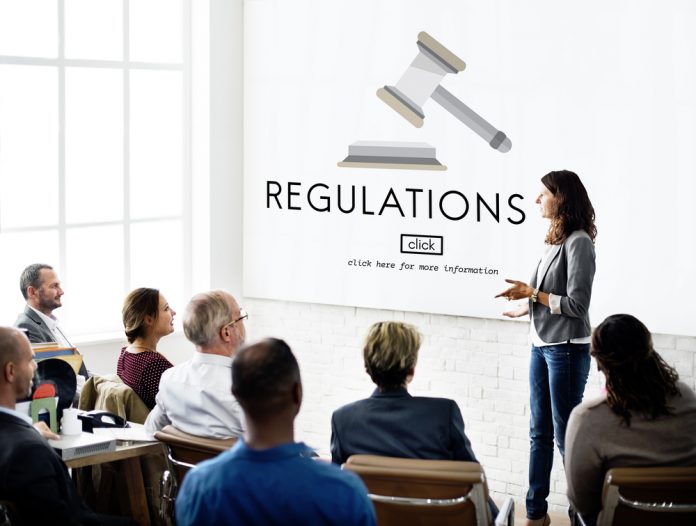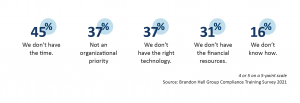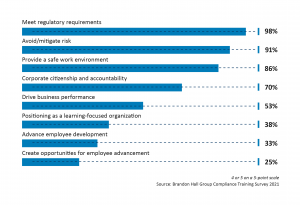
Transactional Grinding
For most organizations, compliance training is seen as a transactional process, focused only on grinding out completions and checking boxes. Even though most employees must go through some form of compliance training, and it can account for a good chunk of an employee’s annual learning, companies do not expect much in the way of outcomes. Only about one-third see compliance training as an opportunity to further employee development.
Which of the Following Applies to Your Organization’s Approach to Compliance Training?
Constraints Around Compliance
Compliance involves multiple parts of the business. Operations are invested because people cannot perform certain jobs if they are not certified or in compliance. Finance and Legal have a big stake as well; compliance keeps the company from facing fines or sanctions from regulatory bodies. There are also HR implications for compliance training. With so many stakeholders and high stakes, it is difficult to get a consensus on making changes to how compliance training is delivered. Additionally, some of the constraints around compliance training are imposed by external agencies, precluding organizations from making radical changes, if any.
Barriers to Making Compliance Training Strategic
Dry and Boring
One of the first learning experiences an employee has with learning is compliance training. It could be standard operating procedures, the employee handbook, sexual harassment training, or job-specific training. But the compliance training experience is typically dry and boring, with no clear link to the business or the learner. This sets the employees up for being disengaged with learning before they even experience another program.
Also, because compliance training is not typically designed the same as other learning programs — with a focus on engaging the learner and driving behaviors — the organization cannot expect outcomes beyond completion. For example, a group of employees can go through forklift training and pass the test. But unless the organization can show that the training resulted in the safe, efficient operation of the forklifts, the training provides little to no ROI.
What Degree Does Your Organization Consider the Following to be the Intended Outcomes of Compliance Training?
Big Questions
- Is our compliance training aligned with business goals?
- Do we apply the same principles and resources to compliance training as we do other types of learning?
- Are we able to create/deliver relevant, engaging compliance content?
- Do learners understand why compliance training is important to them and the business?
Brandon Hall Group’s View
Tie Compliance Training to Business Goals
Organizations expect employees to devote the same amount of time to their compliance training as they would to any other type of learning experience, yet they do not often expect the employees to exhibit specific behaviors or performance changes. Simply completing the training is enough. This represents a wasted learning opportunity. If we expect employees to invest time in compliance training, the business should expect more in the way of results and performance.
The organization must be able to articulate to learners why a particular training program is important to the business. For example, the desired outcome of forklift safety training should not be to check the box that it has been done. It should be that forklift operators are safe and effective, saving the organization money with efficiency and a reduction in accidents, as well as making it a better place to work.
Make Compliance Training Engaging
Just because the programs are compliance-related, does not mean that they must be lengthy lectures or complex eLearning modules. The principles behind how people learn are still relevant in a compliance context. Using a wider range of modalities with space for reflection and practice can still achieve completion goals while doing a better job of conveying the information and changing behaviors. Unless strictly expressed by an outside regulatory agency, the method by which someone gets into compliance can be almost anything. If the employee can demonstrate the skills or knowledge that indicate compliance, those skills and knowledge can be imparted through videos, games, microlearning, or anything that fits the subject matter and the audience.
Make Compliance Training Relevant
Another criticism of most compliance training is that it can be redundant and lack relevancy. Again, companies can employ many of the same strategies and tools used for other areas of learning to make compliance training more relevant. Using assessments to test prior knowledge can allow employees to “test out” of some training, preventing them from wasting their time in programs they don’t need. Companies should also look hard at the audiences for some compliance programs. Many companies take a blanket approach to compliance delivering everything to everyone in hope of getting the most complete coverage. Being more targeted, where possible, cuts down on redundancy and irrelevance.
Make an Organizational Commitment
A company can’t hope to have a strong culture of learning if they do not apply these kinds of strategies to compliance training. They signal that whatever the vision, mission, and strategy may be for learning and development (L&D), they are fungible and do not always apply. This undercuts the message and weakens L&D’s ability to make learning integral to the organization’s culture. As noted earlier, compliance training is often the first learning experience for new hires. If the compliance training programs do not demonstrate the organization’s commitment to learning, it is a struggle to convince learners otherwise.
Click here for information on Brandon Hall Group’s Professional Certification Program







